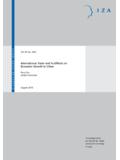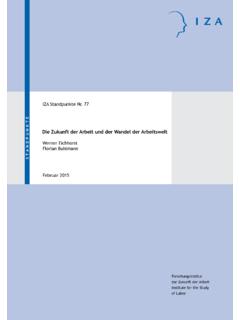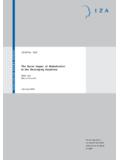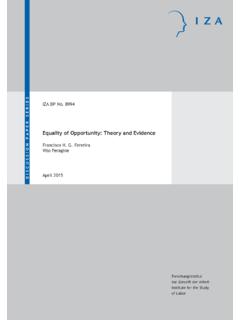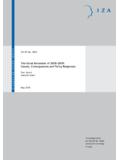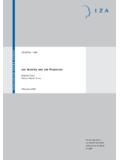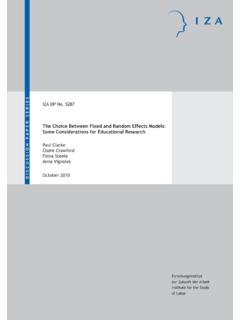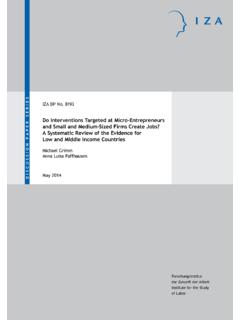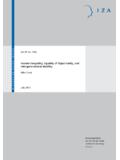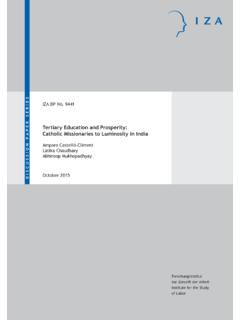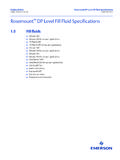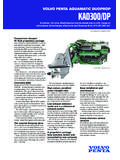Transcription of Human Capital and Education: The State of the Art …
1 Forschungsinstitut zur Zukunft der ArbeitInstitute for the Study of Labor discussion paper SERIESH uman Capital and Education: The State of the Art in the Economics of EducationIZA DP No. 9885 April 2016 Simon Burgess Human Capital and education : The State of the Art in the Economics of education Simon Burgess CMPO, University of Bristol and IZA discussion paper No. 9885 April 2016 IZA Box 7240 53072 Bonn Germany Phone: +49-228-3894-0 Fax: +49-228-3894-180 E-mail: Any opinions expressed here are those of the author(s) and not those of IZA.
2 Research published in this series may include views on policy, but the institute itself takes no institutional policy positions. The IZA research network is committed to the IZA Guiding Principles of Research Integrity. The Institute for the Study of Labor (IZA) in Bonn is a local and virtual international research center and a place of communication between science, politics and business. IZA is an independent nonprofit organization supported by Deutsche Post Foundation. The center is associated with the University of Bonn and offers a stimulating research environment through its international network, workshops and conferences, data service, project support, research visits and doctoral program.
3 IZA engages in (i) original and internationally competitive research in all fields of labor economics, (ii) development of policy concepts, and (iii) dissemination of research results and concepts to the interested public. IZA discussion Papers often represent preliminary work and are circulated to encourage discussion . Citation of such a paper should account for its provisional character. A revised version may be available directly from the author. IZA discussion paper No.
4 9885 April 2016 ABSTRACT Human Capital and education : The State of the Art in the Economics of education * This review describes the research frontier on Human Capital and education in economics research. It delineates what is known and largely agreed, and what are the most promising lines for future research. The approach will be to explain clearly and precisely the research evidence, in a way that makes this accessible to a wide audience. The survey has two particular aims.
5 First, it draws out the implications for key education policy issues, highlighting which policy ideas can be supported by the economics research. To do this, my focus is on research that identifies causal effects. Second, it tries to identify some of the big open research questions and policy knowledge gaps in this field. JEL Classification: I20 Keywords: education , Human Capital Corresponding author: Simon Burgess Centre for Market and Public Organisation School of Economics, Finance and Management University of Bristol 2C1, The Priory Road Complex Priory Road, Clifton BS8 1TU, Bristol United Kingdom E-mail: * This evidence review is produced for COEURE: Cooperation on European Research in Economics.
6 This is a cooperative action financed by the European Commission within the FP7, a forum which brings together the key stakeholders in the European economic research space. Its objective is to formulate an Agenda for Research Funding for Economics in Europe (ARFEE). For more details, see: I would like to thank a number of people for their comments and suggestions. Most thanks of all to Susanna Loeb, who was particularly helpful and made a number of great suggestions to improve the first draft.
7 Many thanks also to Paolo Battaglia, Lex Borghans, Gabriella Conti, Neil Davies, Matt Dickson, Emla Fitzsimons, Robin Naylor, Kjell Salvanes, Ismael Sanz, Paolo Sestito, Helen Simpson, Eleanor Stringer and Anna Vignoles. I would also like to thank Julia Belau, Marc Ivaldi and Wolfgang Leininger for comments and for organisational support. All errors and omissions are my own. 2 Executive Summary education is crucially important for many of the policy outcomes that citizens and politicians care about.
8 At an individual level, your education affects your earnings, your employability, and your chance of succeeding in life having started in a disadvantaged neighbourhood. It also affects your health, future family structure, intellectual fulfilment and other aspects of a good life. At a national level, a country s stock of skills matters hugely for its prosperity and growth rate. The distribution of skills is a big determinant of inequality, and the relationship of a person s skills to their background is central to the degree of social or intergenerational mobility.
9 While many disciplines contribute to our understanding of education , economic analysis can offer key insights for policy-makers. It has a strongly quantitative approach, and a clear framework for understanding the decisions and actions of all the relevant actors. Most importantly, it brings a relentless focus on trying to establish causal links between policy variables and outcomes. While descriptive studies can be invaluable for improving our understanding, policy decisions can only be securely made on the basis of causal relationships.
10 This paper reviews the current State of the evidence in the economics of education . The aim is to identify the frontier of knowledge in this field, to present what is largely agreed, and to sketch out what the open questions for research are. Additionally, the most promising policy options are highlighted. The following issues have been covered in detail: Family background, family investment and the formation of Human Capital ; The growth of, and interconnections between, cognitive and non-cognitive skills; Early childhood interventions; Challenges to the basic Mincer model of the demand for education ; The role of school resources and particularly class size in changing educational outcomes; Measuring teacher effectiveness and identifying effective teachers.
